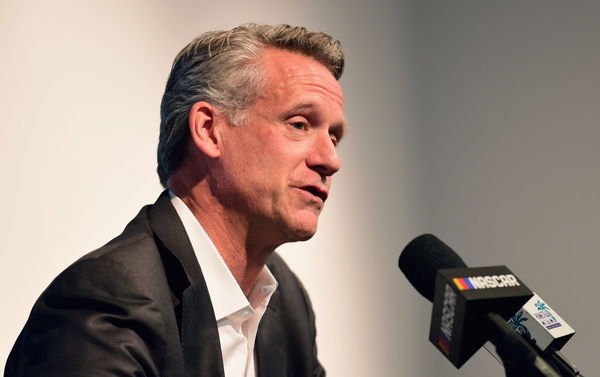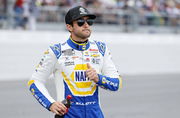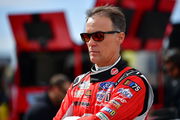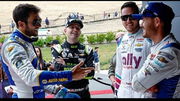
via Getty
HOMESTEAD, FL – NOVEMBER 18: NASCAR President Steve Phelps speaks to the media prior to the Monster Energy NASCAR Cup Series Ford EcoBoost 400 at Homestead-Miami Speedway on November 18, 2018 in Homestead, Florida. (Photo by Jared C. Tilton/Getty Images)

via Getty
HOMESTEAD, FL – NOVEMBER 18: NASCAR President Steve Phelps speaks to the media prior to the Monster Energy NASCAR Cup Series Ford EcoBoost 400 at Homestead-Miami Speedway on November 18, 2018 in Homestead, Florida. (Photo by Jared C. Tilton/Getty Images)
In 2016, Daniel Suárez stood at the pinnacle of NASCAR’s developmental ladder, a Mexican driver who had climbed through the ranks against all odds to become the first foreign-born driver to win an Xfinity Series championship. That journey, fueled by talent and persistence, opened doors for Hispanic drivers in a sport traditionally dominated by American competitors. Nine years later, as NASCAR prepares for its highly anticipated return to Mexico, Suárez finds himself reflecting on the path that brought him to the Cup Series—and the barriers that still exist for those who wish to follow in his footsteps.
The connection between Suárez’s rise and NASCAR’s upcoming event at Autódromo Hermanos Rodríguez runs deeper than mere geography. It represents a full-circle moment for Latino representation in the sport, highlighting both progress made and challenges that remain unaddressed within NASCAR’s international development pipeline.
ADVERTISEMENT
Article continues below this ad
Suárez challenges NASCAR’s Mexico policy
What should be a celebration of NASCAR’s growing international presence has instead sparked concern from one of the sport’s most prominent Latino voices. At Darlington Raceway last weekend, Suárez revealed his behind-the-scenes efforts to create more opportunities for up-and-coming drivers from Latin America. “To be very honest with you, I hate the idea that Cup drivers are allowed to run in the Xfinity Series in Mexico,” Suárez stated bluntly. His frustration, it turns out, had already led him to the offices of NASCAR’s highest executives.
The two-time Cup Series winner disclosed conversations with then-president Steve Phelps (now NASCAR Commissioner) and Executive Vice President Ben Kennedy, where he advocated for restricting Cup Series drivers from the June 14th Xfinity race—a request that ultimately went unheeded. “In my opinion, Cup Series drivers shouldn’t be allowed, and the reason of that is because most of the Cup drivers are going to be taking the seats that other drivers from Mexico, Brazil, Argentina, they could have got, you know, and I had this conversation with Steve Phelps. I (also) had this conversation with Ben Kennedy (NASCAR Executive Vice President and Chief Venue & Racing Innovations Officer) and with several people. Unfortunately, it (discussion) just maybe was a little bit too far down the road already.”
NASCAR’s decision appears especially questionable given its own recent precedent. In 2023, the sanctioning body prohibited Cup Series drivers from entering the inaugural Xfinity Series race on the streets of Chicago—a policy that Suárez believes should have been applied to Mexico as well. “They made a mistake.” His perspective comes from personal experience: “I understand that situation because I came from there. At one point, I was that kid in Mexico, you know, just looking for those opportunities. You cannot expect a kid from Mexico or from Argentina or from Brazil or from Colombia to battle for a seat with a Cup driver.”

USA Today via Reuters
Feb 16, 2022; Daytona, FL, USA; NASCAR Cup Series driver Daniel Suarez (99) during qualifying for the Daytona 500 at Daytona International Speedway. Mandatory Credit: Mike Dinovo-USA TODAY Sports
Despite the setback to his advocacy efforts, Suárez remains focused on the broader implications for talent development. “The Xfinity teams are going to trust more a Daniel Suarez or Alex Bowman, rather than one of these Mexican kids, or kids from Brazil, or a kid from Argentina,” he explained, highlighting how the current policy might inadvertently suppress the next generation of international NASCAR stars.
“I just hope that these international kids get opportunities because these are what these races are all about,” Suárez emphasized. His advocacy highlights a crucial question for NASCAR’s leadership: Does authentic international expansion require more than just racing in different countries? For the sport to truly grow beyond American borders, creating pathways for regional talent may prove just as important as bringing NASCAR’s biggest stars to new markets—a lesson that could shape how NASCAR approaches its global ambitions for years to come.
Trending
NASCAR’s International vision: Beyond Mexico to Brazil
NASCAR’s push into Mexico City represents just the beginning of a broader global strategy, with Brazil emerging as the likely next destination on the international calendar. Cup Series Managing Director Brad Moran recently confirmed these expansion plans, stating, “We have a big drive on going global and we’re definitely doing it… We’d love to get to Brazil and Canada and Europe. Mexico’s our first stop on the global stage.” This revelation aligns with earlier reports from Adam Stern of the Sports Business Journal, who indicated that NASCAR was considering taking the exhibition Clash to South America as early as next year.
ADVERTISEMENT
Article continues below this ad
The sport’s international ambitions have been building for several years, with NASCAR Executive Vice President Ben Kennedy consistently highlighting global expansion as one of the organization’s “biggest growth opportunities.” The NASCAR Brazil Series has already established a foothold in the South American market, creating a foundation upon which larger Cup Series events could build. However, as Moran acknowledged, the logistics remain challenging: “This is going to be really challenging and test all of us… it’s gonna be tough.”
These international moves come as NASCAR balances revitalizing its American heritage—evidenced by the return to Bowman Gray Stadium after nearly five decades—while simultaneously pursuing new markets abroad. For drivers like Suárez, this global strategy presents both an opportunity and a concern. If NASCAR truly wants to attract more eyes towards their sport, they will need more personalities like Suárez competing at the top level.
ADVERTISEMENT
Article continues below this ad
ADVERTISEMENT
ADVERTISEMENT
ADVERTISEMENT
ADVERTISEMENT






